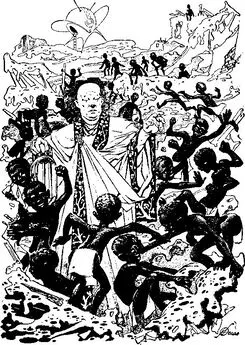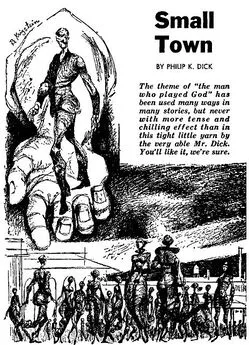Philip Kerr - Gridiron
- Название:Gridiron
- Автор:
- Жанр:
- Издательство:Vintage
- Год:2010
- ISBN:9780099594314
- Рейтинг:
- Избранное:Добавить в избранное
-
Отзывы:
-
Ваша оценка:
Philip Kerr - Gridiron краткое содержание
In the heart of a huge, beautiful new office building in downtown Los Angeles, something has gone totally, frighteningly wrong. The Yu Corporation Building, hailed as a monument to human genius, is quietly snuffing out employees it doesn't like. The brain of the building can't be outsmarted or unplugged — if the people inside are to survive, they'll have to be very, very lucky.
Gridiron - читать онлайн бесплатно полную версию (весь текст целиком)
Интервал:
Закладка:
'Well thanks, Miss Hussey. Thanks a lot.' Sam smiled politely, wondering if it was actually possible to read anything from the library: from the way Helen had described it, it sounded like just another way of watching television. After leaving prison he had vowed he would never watch television again.
He watched her get into her car and then went back up to the atrium floor where the piano was playing an Impromptu by Schubert in the style of Murray Perahia. Although he liked the music, Gleig was always a little unnerved by the sight of the keys playing as if an invisible person was sitting on the piano stool. More so now that Hideki Yojo was dead. It still shook him when he remembered those blackened eyes. Epilepsy. What a way to go.
Death was a subject often on Gleig's mind. He knew it was the solitude of the job that was responsible. Sometimes, touring the building at night, it was like being inside some huge mausoleum. Preoccupied with death and dying, and with so much time on his hands he had become something of a hypochondriac. But what worried him more than the idea that he too might suffer an epileptic fit was the awareness that he knew nothing at all about it or what warning signs to watch out for. As soon as he had the opportunity Sam accessed the encyclopedia in the electronic library.
After selecting the appropriate category with his mouse there was a momentary pause and then an Aaron Copland fanfare of trumpets that caused his heart to leap in his chest.
'Welcome to the encyclopedia,' announced the computer.
'Damn,' he exclaimed nervously, 'don't do that. Machine, you scared the shit out of me.'
'The information resource that covers all fields of human learning and history in all times and places. Quite simply, you have before you the most complete information archive anywhere on earth. Entry titles are alphabetized according to the English language A-Z.'
'No kidding,' grunted Gleig.
'All diacritcal marks and foreign letters without parallels in English are ignored in this alphabetization.'
Gleig shrugged to himself, unsure if his previous remark had been critical or not.
'Titles beginning with numbers, such as 1984 , the novel by George Orwell, are alphabetized as if the numbers were written out Nineteen Eighty-Four. When you have decided upon the entry that you require you may take up any cross-references, or you may browse among countless subjects that are grouped around the original entry point. Now type your chosen subject please.'
Gleig thought for a moment and then typed uncertainly:
IPPYLEPPSY
'The subject you require does not exist. It may be that you have misspelled it. Try again.'
IPPILEPPSY
'No. That's no good either. Okay, here's my suggestion. If you are searching for information on a disease of the nervous system characterized by paroxysms, in which the patient falls to the ground unconscious, with general spasm of the muscles and sometimes foaming at the mouth like a rabid dog, aka "the falling sickness", then the word you require will now appear on screen in its correct spelling. If this is the subject you require then indicate your choice by typing YES.'
EPILEPSY?
YES
Almost instantaneously Gleig was watching a film of a man lying on the ground jerking uncontrollably and frothing at the mouth.
'Heavenly Father,' he breathed. 'Lord above. Will you look at that poor sonofabitch?'
'It has been estimated that 6–7 per cent of the population suffer at least one epileptic seizure at some time in their lives, and that 4 per cent have a phase when they are prone to recurrent seizures.'
'Is that a fact?'
The picture changed to the marble head of a bald and bearded man.
'The definition of the condition is generally attributed to Hippocrates.'
'Is he the guy who committed suicide?'
The computer ignored the interruption.
'Epilepsy is not a specific disease but rather a complex of symptoms that results from any number of conditions that excessively excite nerve cells of the brain.'
'You mean, like Miss Hussey?' Sam Gleig chuckled obscenely. 'Man, she sure as hell excites my tired old brain.'
The picture of Hippocrates gave way to several other pictures: one of the brain, an electroencephalogram, the German psychiatrist Hans Berger, and the father of British neurology, Hughlings Jackson. But it was the computer's explanation of the types of seizure and in particular focal seizures and their causes that really interested Sam Gleig.
'A focal sensory seizure may sometimes be caused by a stroboscopic light and for this reason those people who suffer from photosensitive epilepsy are often advised to avoid nightclubs and computers.'
'God damn,' breathed Gleig as he recollected the burn he had sustained on the back of his hand from the fancy-looking desk lamp on Hideki Yojo's desk.
'Of course. It wasn't the computer screen at all. God damn. It was the desk light. It was red hot.'
He looked instinctively at the back of his hand. The burn, about the size of a quarter, was still there. Remembering some of the nightclubs he had been to as a younger man and the nauseous effect that the flashing lights had sometimes produced in him, Gleig was suddenly sure that he could now offer a slightly different explanation for what had caused Hideki Yojo's death.
'What else could it have been?'
He reached for the telephone, thinking that he had to call someone and tell them what he suspected. But who? The cops? The ex-con in him recoiled from any further contact with LAPD. Helen Hussey? How would she feel about him calling her at home? Warren Aikman? Maybe he was still working upstairs. Except that Sam liked talking to the clerk of works about as much as he liked talking to the LAPD. Aikman had a habit of making him feel small and unimportant. Maybe it could wait until the morning after all, when he could tell Helen Hussey in person. Besides, it would give him an excuse to speak to her. So he stayed where he was, browsing through EPILOBRIUM, EPISCOPACY, EPISTEMOLOGY,
ERASMUS, ERNST, EROS and ESAU.
Allen Grabel found himself on the fourth floor of the Gridiron, near the computer room. As plans went his was not a particularly sophisticated one, but he did not doubt it would be effective. To screw Richardson he would screw his building. And the best way to do that was to screw the computer. Just walk in there with a heavy object and do 40 million dollars' worth of damage. Short of killing Richardson he could think of no more effective way of getting back at him. He had wanted to do it earlier, only something had stopped him. Now he was actually on his way. He had a flat sheet of steel in his hands, about the size of a roof tile, something the builders had left behind in the basement. It was not very easy to carry but, having resolved to do some damage, he had discovered a lack of blunt instruments about the building. This was all he had been able to find. And the corners looked sufficiently unyielding to smash a few screens and maybe puncture the computer housings themselves. He was approaching the little glass bridge when he heard the Disklavier piano starting to play. It was a piece of music he recognized by Oliver Messiaen. And it heralded someone crossing the atrium floor.
Sam Gleig exited the multimedia program just after one o'clock and, regular as clockwork, picked up his Maglite to begin his foot patrol of the Gridiron.
Helen Hussey was right, of course. There was absolutely no need for it. He could have kept an eye on things just as well from the comfort of his office. Better. With all the computer's CCTV cameras and sensors, he was all seeing, all sensing. Everywhere at once. It was like being God. Except that God wouldn't have needed the exercise. God didn't have to worry about his heart, or his waistline. God would have taken the elevator. Sam Gleig took the stairs.
He didn't need to carry the Maglite, either. Wherever Gleig went in the building electric lights came on as sensors picked up his body heat and the vibrations of his footsteps. But he took the flash anyway. You couldn't be a proper night-watchman if you didn't carry a Maglite. It was a symbol of the job. Like the gun he wore on his hip.
As he neared the piano it started to play, and for a moment he stopped and listened. The music was strange and haunting and seemed only to underline the still and solitude of a night in the Gridiron. It gave him goose flesh. Gleig shivered and shook his head.
'Weird stuff,' he remarked. 'Give me Bill Evans any day of the week.'
He climbed the stairs to the fourth floor and wandered along to the computer room to see if anyone was working late. But the darkened room across the glowing glass bridge was empty. Dozens of tiny red and white lights glowed in the depths like a small city seen from the window of an aeroplane.
'That's OK then,' he said. 'You don't want any more folks dyin' on your shift. Last thing you need is a lot of dumb cops askin' a lot of fool questions.'
He stopped and turned, thinking he had heard something. As if someone had gone down the same stairs he had just climbed. He started to retrace his footsteps. That was the thing about being a security guard, he reminded himself. You heard things and for a second you assumed the worst. Still, there was no harm in being suspicious. He was paid to be suspicious. Suspicion was what got most crimes stopped in their tracks. He walked to the stairwell, and stopped, listening. Nothing. To make sure he walked back down to the atrium and patrolled the whole floor area. A dull thud echoing from somewhere caused his heart to leap in his chest.
'Anyone there?' he called.
He waited a moment and then started back towards the security office. Back in his office Gleig sat down in front of the computer screen and requested a list of all the building's occupants. He was relieved to find that his own name was the only one on the computer. He shook his head and grinned. In a building the size and sophistication of the Gridiron it would have been surprising not to have heard a few strange noises.
'Probably the air-conditioning starting up,' he said to himself. 'It is kind of hot in here. I guess this building isn't made for people who want to keep in shape.'
He stood up and went back to the atrium, intent on completing his rounds. Maybe he would take a look in the basement. His dark blue shirt was sticking to his body. He undid his tie and unbuttoned his collar. This time he took the elevator.
Book Three
'Problem: How shall we impart to this sterile pile, this crude, harsh, brutal agglomeration, this stark, staring exclamation of eternal strife, the graciousness of those higher forms of sensibility and culture that rest on the lower and fiercer passions? How shall we proclaim from the dizzy height of this strange, weird modern housetop the peaceful evangel of sentiment, of beauty, the cult of higher life?'
Louis Sullivan, on tall office buildingsIn beginning Earth was without Quantity. Humanplayer said, Let there be Numbers so we might classify things; and there were Numbers. And Humanplayer separated Numbers from multitude. And Humanplayer said, Let us develop computational methods to solve linear/quadratic problems, for Numbers are not just practical tools, but worthy of study in own right. And Humanplayer called same study Mathematics. And Humanplayer said, more demanding measurements and calculations require that number system should use zero as number, and point or comma to separate parts of numbers greater and less than 1; and he called same system, Positional Base Notation. For Humanplayer Leibniz, 1 stood for God, and 0 stood for Void. And Humanplayer said, using only these two symbols to distinguish meaning eliminates need to recognize 10 symbols, for most systems were decimal, using base-10 system. And Humanplayer called these numbers Dyadic, or Binary. Numbers became simpler but longertoo, and vast ROM needed to rememberthem. And Humanplayer said, Let us build machine to remember numbers for us, and let each 1 or 0 be called BIT, and let us call pattern of eight Bits, Byte, and let us call two or four Bytes a Word. This is the beginning. And let us call our new machines Computers. You are now leaving the first level of difficulty. Are you sure you want to do this? Answer Y/N. OK, but you have been warned. And numbers were without end. All is number, and number is finegood. For numbers are converted into actions and actions are converted into numbers; input becomes output which in turn becomes input etc. - data constantly transformed into more amenable basis for doing something else, ad infinitum. Number makes world go around. Computers makesure all numbers mean something gets done. This brings about sense of organization that is infallible. You are running low on energy. If only everything reduced to number then random, chaotic nature of world overcome, or predicted, for there is stability in an average, order in a mean, and law in a median. Is it not so? For now there is nothing, no aspect of existence that is not subject of percentage or statistic. That is not a door, it is a wall, stupid. Once world was run according to entrails of bird. Extispicy. Now it is run according to Number, and probability is placed ahead of knowledge and learning. Computers and those who serve them, humanplayer statisticians and psephologists, the stochastic community who are in charge, reducing world and problems to collection of weighted maybes, delivering not what is needed so much as what computers able to do. Fuzzy Wuzzy was a bear. Fuzzy Wuzzy lost his hair. Fuzzy Wuzzy wuzzn't fuzzy wuzz he?
Читать дальшеИнтервал:
Закладка:








